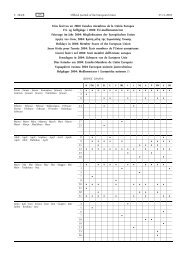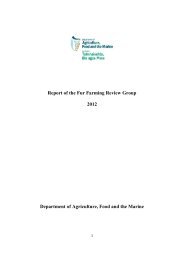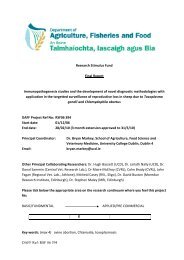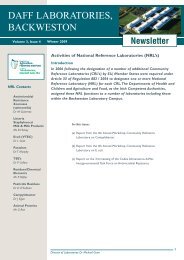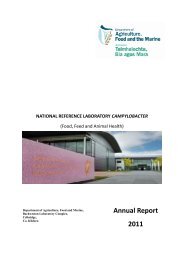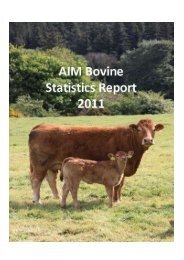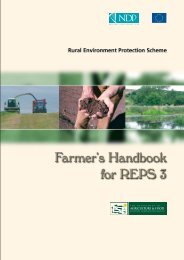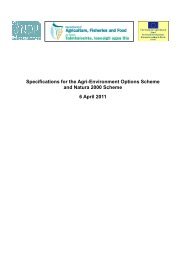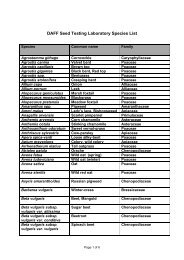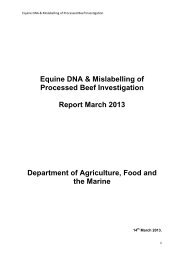Food Research Ireland - Department of Agriculture
Food Research Ireland - Department of Agriculture
Food Research Ireland - Department of Agriculture
Create successful ePaper yourself
Turn your PDF publications into a flip-book with our unique Google optimized e-Paper software.
Sensory analysis is a cross-cutting capability required by all food sectors and is<br />
relevant to consumer products and food ingredients alike. The impacts <strong>of</strong> new<br />
processing technologies and formulations on the sensory attributes <strong>of</strong><br />
products have to be assessed, as does the introduction <strong>of</strong> novel ingredients.<br />
Attempts to improve or otherwise enhance the flavour and texture <strong>of</strong> foods<br />
also require extensive sensory research and sensory research is needed to<br />
support efforts to “re-engineer” foods to allow them to meet new consumer<br />
trends. It is essential to expand <strong>Ireland</strong>’s sensory analysis and research<br />
capabilities; aligning them towards providing greater support to industry.<br />
Capturing opportunities to create functional foods based on fish, meat, dairy,<br />
algae or plants are likely to require a high level <strong>of</strong> knowledge <strong>of</strong> encapsulation<br />
technologies. <strong>Research</strong> is required to ensure that bioactives included in the<br />
food matrix remain stable and that delivery is precisely targeted. Developing<br />
non-food uses for food bioactives, as planned by industry for some marine<br />
ingredients, will rely on encapsulation technology to enhance the stability,<br />
bioactivity and delivery <strong>of</strong> these bioactive compounds.<br />
As with food product development and innovation, scale-up <strong>of</strong> research<br />
outputs to industrial production will be a critical factor in ensuring maximum<br />
value from the investments made in research and a key enabler <strong>of</strong> growth<br />
within our industry.<br />
4.2.1 KEY INVESTMENT AREA –FOOD PROCESSING TECHNOLOGIES<br />
Investment in food processing technologies is critical to underpin and facilitate<br />
successful product development, scale-up and commercialisation <strong>of</strong> premium,<br />
value added food products enriched with ingredients, e.g. ingredients<br />
developed as part <strong>of</strong> mining milk or marine species. Conservation <strong>of</strong> structure<br />
and functionality <strong>of</strong> such ingredients in formulated food systems throughout<br />
processing and shelf-life is essential. Significant State investments in recent<br />
years in processing technology research and development infrastructure (i.e.<br />
FIRM Strategic Equipment Initiative, PRTLI) have facilitated development and<br />
expansion <strong>of</strong> resources and facilities in the area <strong>of</strong> food processing technology.<br />
<strong>Food</strong> <strong>Research</strong> <strong>Ireland</strong><br />
The expected increase in the global population and the rise <strong>of</strong> the BRIC’s,<br />
provides a long term opportunity for <strong>Ireland</strong>, especially for the dairy sector.<br />
To ensure maximum exploitation <strong>of</strong> this opportunity, research capability in the<br />
areas <strong>of</strong> dehydration, separations and thermal processing will have to be<br />
supported to allow access by Irish food manufacturers to these emerging<br />
markets. With the targeted increase in milk production, Irish dairy processors<br />
can only address this growing market opportunity through dehydration (spray<br />
drying) / concentration <strong>of</strong> milk. In addition, research is also required in the<br />
area <strong>of</strong> food preservation to ensure foods retain their functionality and quality<br />
during transport and storage. These new preservation processes will require<br />
innovative packaging solutions which in some instances, will drive the<br />
processing innovations.<br />
Whilst microbiological and chemical stability <strong>of</strong> formulated food systems are<br />
important, the physical stability <strong>of</strong> such products is a key determinant <strong>of</strong> their<br />
consumer acceptability. In the context <strong>of</strong> accessing global markets, research<br />
into the complex interactions between ingredients, processing<br />
technology/parameters and storage/transport conditions determining the<br />
overall structure and physical stability <strong>of</strong> food systems is needed. For example,<br />
research into the physical stability and reconstitution properties <strong>of</strong> milk powder<br />
products exported to Asia for use as is or as ingredients in formulated food<br />
products will be required. It should be noted that developments in processing<br />
technology will have to be underpinned by food chemistry and nutrient<br />
interactions supported by colloidal and physical (including materials) science.<br />
In addition, traditional as well as novel processing technologies can address<br />
more fundamental challenges that face the food industry as well as enhance<br />
competitiveness. No more so than in the beef sector, where a major challenge<br />
exists in reducing greenhouse gas emissions by adopting more energy efficient<br />
heating methods from what is a high-energy demand industry, associated with<br />
processing. Scope also exists to transfer heating technologies to other sectors<br />
such as dairy, beverage, marine and prepared consumer foods, all <strong>of</strong> which<br />
have high-energy processing demands.<br />
▼<br />
31




